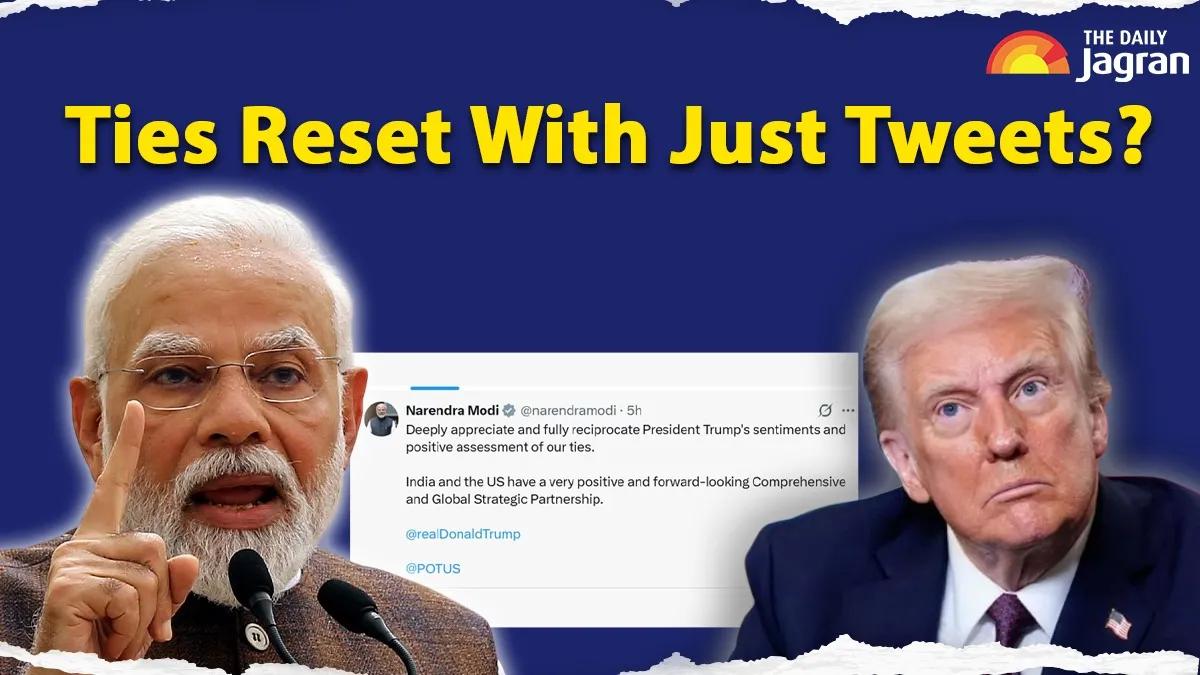- By Ajeet Kumar
- Sat, 06 Sep 2025 04:23 PM (IST)
- Source:JND
India-US relations reset: US President Donald Trump has appeared to backtrack from his previous remark about "losing" India to China. This prompted a positive reply from Prime Minister Narendra Modi via a tweet on Saturday. But experts question— whether two tweets are enough to mend ties between India and the United States?
Reacting to the recent development, former diplomat KP Fabian on Saturday weighed in on Trump's remarks on India, tariffs, and PM Modi's diplomatic response, calling Trump's comments contradictory and urging caution against taking them at face value. “PM Modi has done the correct thing diplomatically, responding to a tweet in the best diplomatic fashion. But I do not think these two tweets make much of a difference at this stage,” Fabian said.
#WATCH | On PM Modi's response to US President Donald Trump speaking positively on India-US relationship, former diplomat KP Fabian says, "PM Modi has done the correct thing diplomatically, responding to a tweet in the best diplomatic fashion. But I do not think these two tweets… pic.twitter.com/wrnnhb9syO
— ANI (@ANI) September 6, 2025
What did Trump say about his relations with PM Modi?
At a White House press conference on Friday, Trump was asked about his comment on whether he blamed anyone for "losing India to China". He responded, "I don't think we have."He added that he gets "along very well" with Prime Minister Modi but was "very disappointed" with India over New Delhi's purchase of Russian oil. "I've been very disappointed that India would be buying so much oil, as you know, from Russia, and let them know that we put a very big tariff on India, 50 per cent tariff, very hot tariff," he noted.
ALSO READ: Trump Flips On India, Calls PM Modi 'Friend'; Reaffirms India-US 'Special' Ties Despite Tariff Row
Responding to his response, Prime Minister Narendra Modi responded warmly to Trump's affirmation of India-US ties, expressing that he "deeply appreciates and fully reciprocates" the US President's sentiments and positive assessment of the bilateral relations.
Deeply appreciate and fully reciprocate President Trump's sentiments and positive assessment of our ties.
— Narendra Modi (@narendramodi) September 6, 2025
India and the US have a very positive and forward-looking Comprehensive and Global Strategic Partnership.@realDonaldTrump @POTUS https://t.co/4hLo9wBpeF
If you contradict yourself, then...: Fabian
"President Trump's style of arguing reminds me of Aristotle, who said that if you contradict yourself, then I don't have to contradict you. So President Trump has contradicted himself. First, he said that he has lost India to China. Now he says he hasn't lost it,” noted Fabian.
ALSO READ: ‘India Will Continue Buying It': Nirmala Sitharaman Cites Economic Interests On Russian Oil Imports
Warning against overreading Trump's remarks, Fabian said, "The tendency in India is to take seriously every statement, tweet or otherwise, by President Trump and to see in that statement a policy or change of policy. No, that is wrong."
President has not fully understood India: Sikri
Trump's sudden shift in his tone towards its ties with India has sparked renewed interest, and some confusion, in the geopolitical landscape, but for former Indian diplomat Veena Sikri, the answer may lie not in the politics of the situation but in a fundamental aspect of Trump's of India's strategic doctrine. During an interview with ANI on Saturday, Sikri offered a measured response to Trump's characterisation of the India-US ties as a "very special relationship" days after he claimed that Washington had "lost Russia and India to deepest, darkest China."
She noted the US President has not fully understood India's longstanding policy of strategic autonomy, which lies at the core of its foreign policy. "I must say that President Trump's post yesterday was very disappointing because he used terms like, 'I think we have lost India,' so that people were getting a little worried about that," she said.
"Even at that time, I had said clearly that President Trump has possibly not understood India's policy of strategic autonomy. India's foreign policy is based on strategic autonomy, which means that each relationship is taken on its own merits and is not a zero-sum game, which means that we are not developing relations with China at the cost of the USA or we're not developing relations with Russia at the cost of the USA," the former diplomat added.
Sikri explained that the US may need to get more comfortable with multipolar diplomacy, and photographs of leaders like PM Modi, President Putin, and President Xi in the same frame shouldn't be seen as diplomatic red flags but as a reflection of India's balanced and pragmatic approach.
(With inputs from agencies)

